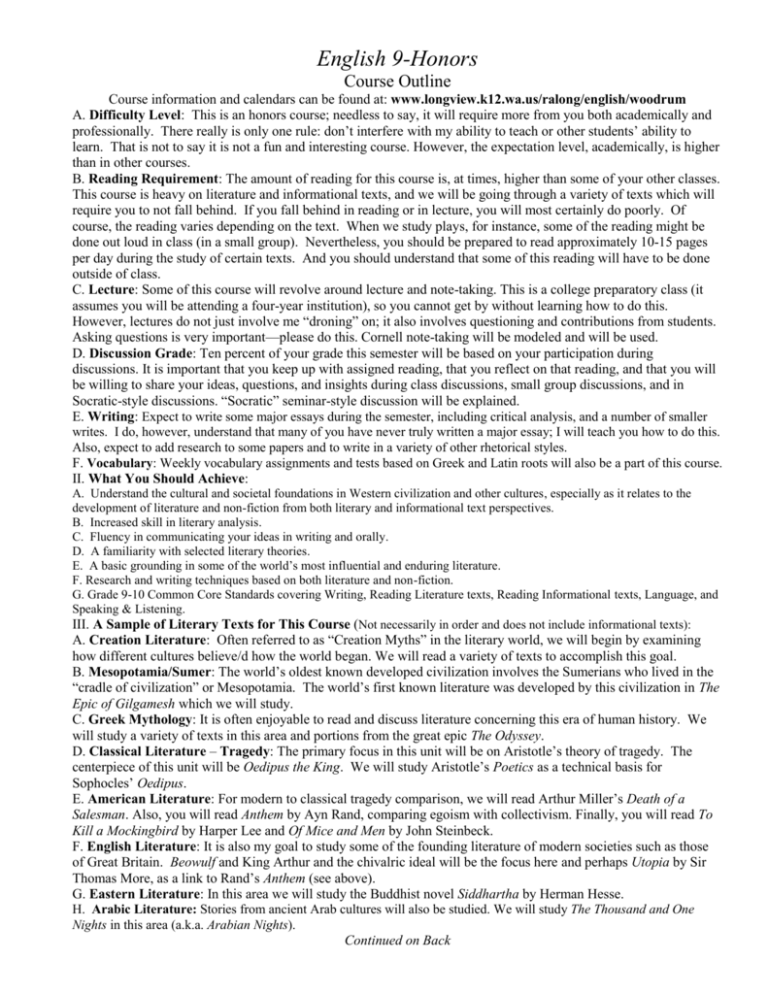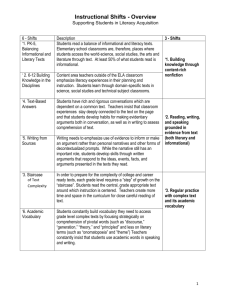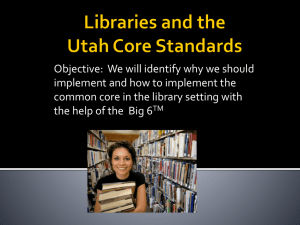Course Outline
advertisement

English 9-Honors Course Outline Course information and calendars can be found at: www.longview.k12.wa.us/ralong/english/woodrum A. Difficulty Level: This is an honors course; needless to say, it will require more from you both academically and professionally. There really is only one rule: don’t interfere with my ability to teach or other students’ ability to learn. That is not to say it is not a fun and interesting course. However, the expectation level, academically, is higher than in other courses. B. Reading Requirement: The amount of reading for this course is, at times, higher than some of your other classes. This course is heavy on literature and informational texts, and we will be going through a variety of texts which will require you to not fall behind. If you fall behind in reading or in lecture, you will most certainly do poorly. Of course, the reading varies depending on the text. When we study plays, for instance, some of the reading might be done out loud in class (in a small group). Nevertheless, you should be prepared to read approximately 10-15 pages per day during the study of certain texts. And you should understand that some of this reading will have to be done outside of class. C. Lecture: Some of this course will revolve around lecture and note-taking. This is a college preparatory class (it assumes you will be attending a four-year institution), so you cannot get by without learning how to do this. However, lectures do not just involve me “droning” on; it also involves questioning and contributions from students. Asking questions is very important—please do this. Cornell note-taking will be modeled and will be used. D. Discussion Grade: Ten percent of your grade this semester will be based on your participation during discussions. It is important that you keep up with assigned reading, that you reflect on that reading, and that you will be willing to share your ideas, questions, and insights during class discussions, small group discussions, and in Socratic-style discussions. “Socratic” seminar-style discussion will be explained. E. Writing: Expect to write some major essays during the semester, including critical analysis, and a number of smaller writes. I do, however, understand that many of you have never truly written a major essay; I will teach you how to do this. Also, expect to add research to some papers and to write in a variety of other rhetorical styles. F. Vocabulary: Weekly vocabulary assignments and tests based on Greek and Latin roots will also be a part of this course. II. What You Should Achieve: A. Understand the cultural and societal foundations in Western civilization and other cultures, especially as it relates to the development of literature and non-fiction from both literary and informational text perspectives. B. Increased skill in literary analysis. C. Fluency in communicating your ideas in writing and orally. D. A familiarity with selected literary theories. E. A basic grounding in some of the world’s most influential and enduring literature. F. Research and writing techniques based on both literature and non-fiction. G. Grade 9-10 Common Core Standards covering Writing, Reading Literature texts, Reading Informational texts, Language, and Speaking & Listening. III. A Sample of Literary Texts for This Course (Not necessarily in order and does not include informational texts): A. Creation Literature: Often referred to as “Creation Myths” in the literary world, we will begin by examining how different cultures believe/d how the world began. We will read a variety of texts to accomplish this goal. B. Mesopotamia/Sumer: The world’s oldest known developed civilization involves the Sumerians who lived in the “cradle of civilization” or Mesopotamia. The world’s first known literature was developed by this civilization in The Epic of Gilgamesh which we will study. C. Greek Mythology: It is often enjoyable to read and discuss literature concerning this era of human history. We will study a variety of texts in this area and portions from the great epic The Odyssey. D. Classical Literature – Tragedy: The primary focus in this unit will be on Aristotle’s theory of tragedy. The centerpiece of this unit will be Oedipus the King. We will study Aristotle’s Poetics as a technical basis for Sophocles’ Oedipus. E. American Literature: For modern to classical tragedy comparison, we will read Arthur Miller’s Death of a Salesman. Also, you will read Anthem by Ayn Rand, comparing egoism with collectivism. Finally, you will read To Kill a Mockingbird by Harper Lee and Of Mice and Men by John Steinbeck. F. English Literature: It is also my goal to study some of the founding literature of modern societies such as those of Great Britain. Beowulf and King Arthur and the chivalric ideal will be the focus here and perhaps Utopia by Sir Thomas More, as a link to Rand’s Anthem (see above). G. Eastern Literature: In this area we will study the Buddhist novel Siddhartha by Herman Hesse. H. Arabic Literature: Stories from ancient Arab cultures will also be studied. We will study The Thousand and One Nights in this area (a.k.a. Arabian Nights). Continued on Back I. French Literature: For this area you will read the play No Exit, by Jean Paul Sartre, if time allows as a link to Philosophical existentialism. J. Independent Study: Students will have the opportunity to study literature of their choosing. Literature from all around the world will be made available in an independent research assignment. K. Informational Non-Fiction: The above units will also be supplemented with informational texts that are nonfiction in nature. L. Essays: Students will write a variety of essays, including literary analysis, expository, persuasive & creative. *A variety of informational texts supplement all of the above areas* M. Grammar: Lessons in standard English usage in writing will occur based on what I am seeing in student writing. For example, lessons in possessives, homonyms, capitalization, fragments, run-ons, etc., will occur as these problems appear in essays and other formal writing pieces. Attendance/Grading I. ATTENDANCE: You need to be here every day we have class—it’s crucial. You will quickly find yourself falling behind and even failing the course if your attendance is poor. II. GRADING POLICY: Grading in this class is “cumulative.” The grade you have at any time is the total of points you have earned divided by the total points possible. In other words, an “A” first quarter and a “C” second quarter does not necessarily equal a “B” for a final grade. This is mainly because the total points for each quarter may not be equal. Other than progress reports, it will be your responsibility to keep track of your total points if you want to verify your overall grade (I simply don’t have time to go over overall grades during passing times or during class. If you need a clarification, see me at 2:30 or use your Skyward login to check your grade online). Scoring for letter grades is as follows: 93% - 100% = A 90% - 92% = A87% - 89% = B+ 83% - 86% = B 80% - 82% = B77% - 79% = C+ 73% - 76% = C 70% - 72% = C67% - 69% = D+ 60% - 66% = D 0% - 59% = F III. Late Work Policy: Unless late work results from an excused absence, 10% will be deducted from it for each school day that it is late. It won’t be accepted for any credit after that. An exception to this policy relates to major assignments during the semester which are intended to be a measure of your overall competency of Common Core skills. These types of assignments are large projects and major essays/research papers. While they may not be accepted for full credit, I will still accept these since doing them is critical to your demonstration of competency, and because not doing them makes passing the course impossible or nearly so. A late penalty will still be assessed, which will be determined on a case-bycase basis. However, please avoid this scenario.







